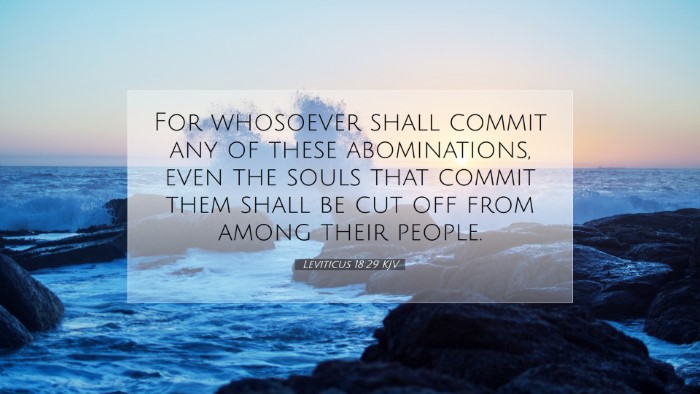Commentary on Leviticus 18:29
Verse: "For whosoever shall commit any of these abominations, even the souls that commit them shall be cut off from among their people."
Introduction
This verse from Leviticus forms part of the Mosaic Law, which outlines the divine regulations for the Israelites. It serves as a crucial reminder of God’s holiness and the seriousness of sin. The purpose of this commentary is to delve into the profound implications of this text, drawing from the insights of various public domain commentaries.
Understanding the Context
This passage occurs within a broader section of Leviticus, which outlines various laws regarding sexual morality and idolatry. The earlier verses (Leviticus 18:1-28) detail specific prohibitions against various forms of immoral conduct, which are labeled as abominations. In context, Leviticus 18:29 serves as both a warning and a divine decree regarding the serious consequences of such actions.
Historical Context
Understanding the historical context of ancient Israel is vital. The Israelites were about to enter the Promised Land, a region inhabited by various nations that practiced numerous immoralities that God explicitly forbade. The Lord’s intent was to establish a holy community, distinctly separate from the pagan practices surrounding them. As noted by Matthew Henry, “God’s people must not only abstain from evil but be zealous in maintaining the purity of the covenant.”
Thematic Insights
Leviticus 18:29 presents a critical theme of separation from sin, which echoes throughout the biblical narrative. The phrase "cut off from among their people" emphasizes the communal aspect of covenant life. Sin does not just affect the individual; it can corrupt the entire community.
Divine Judgment and Responsibility
Albert Barnes comments that the term “cut off” signifies a severe form of divine judgment, indicating a loss of relationship with both God and the community. This reflects the gravity of disregarding divine commandments. It implies that such actions have repercussions not only for personal spirituality but also for communal integrity.
Moral Implications for Today
In contemporary application, the essence of this message remains relevant: sin brings a wedge between God and His people. Adam Clarke suggests that believers today must likewise consider the societal implications of tolerating immorality within their communities. The call to holiness transcends the Old Testament context and provides a foundational understanding of New Testament teachings concerning righteousness and communal ethics.
Exegesis of Key Terms
- Abominations: This term indicates practices that are particularly detestable in the sight of God. The acts referenced in earlier verses include sexual immorality, which is repeatedly condemned.
- Cut off: The Hebrew term for “cut off” (karath) denotes a severance from God’s covenant promises and communal identity. It serves as both a warning and a call to repentance.
Practical Applications for Believers
Understanding the seriousness of sin as depicted in Leviticus 18:29 encourages a self-examination among believers. Emphasizing personal holiness becomes essential for a thriving spiritual life. Consider the following applications:
- Comprehensive Awareness of Sin: Believers should cultivate a heightened awareness of what constitutes sin in their lives, ensuring they reject all evil.
- Community Accountability: The Christian community must hold one another accountable to Biblical standards as an act of love and concern for spiritual well-being.
- Emphasis on Grace: Understanding the law’s intent leads to a deeper appreciation for grace through faith in Christ, who fulfills the law and offers redemption.
Conclusion
Leviticus 18:29 is not merely an archaic directive but a timeless reminder of the holiness required from God’s people. By investigating this passage with insights garnered from historical and scholarly contexts, pastors, students, theologians, and Bible scholars can come to appreciate its significance in guiding moral conduct and the importance of community in the sanctification process. As we reflect on this text, may we be challenged to pursue holiness, guided by the light of Scripture and the grace of our Lord Jesus Christ.


